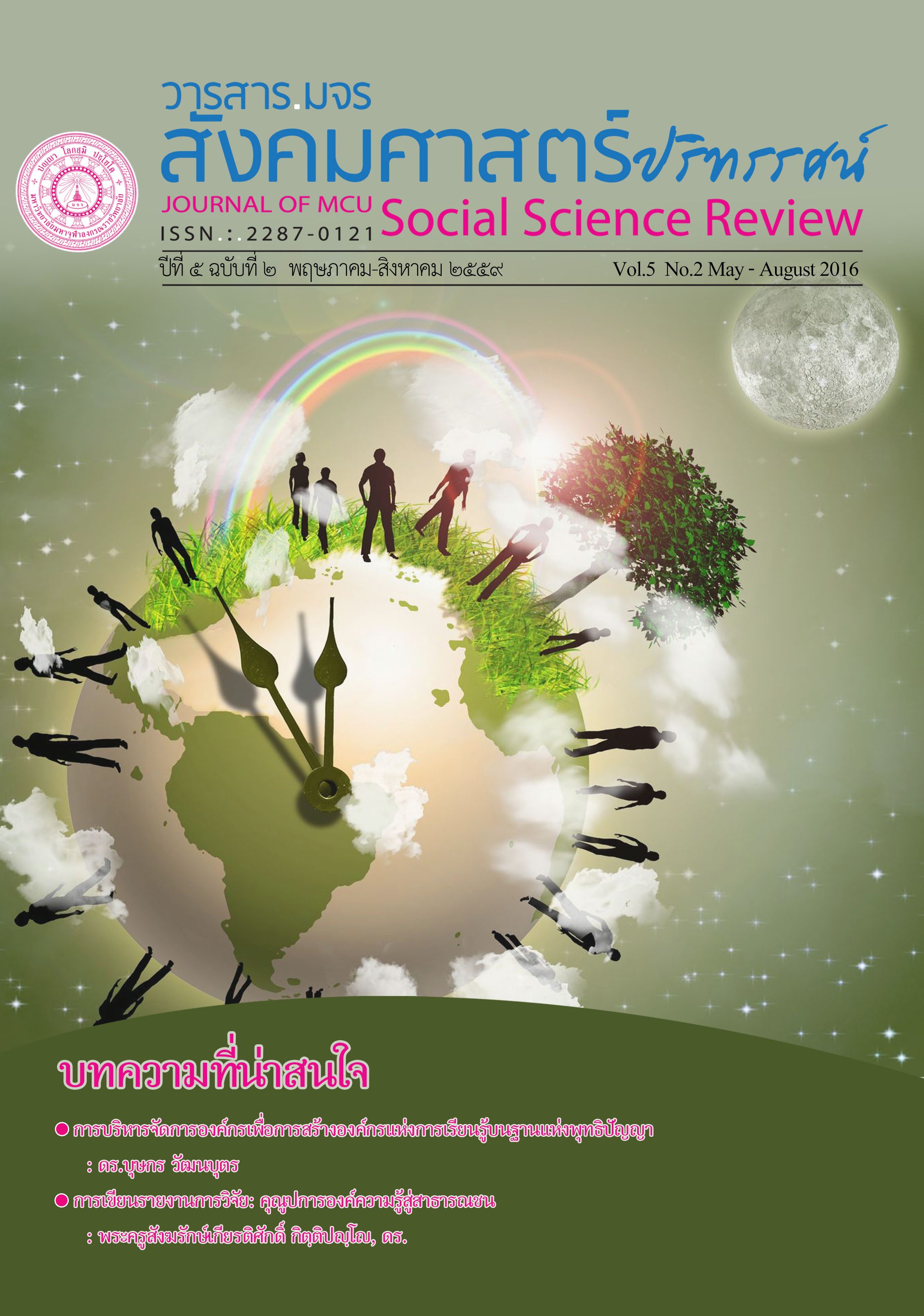วัฒนธรรมองค์การตามหลักสังคหวัตถุ ๔
คำสำคัญ:
วัฒนธรรม, วัฒนธรรมองค์การ, สังคหวัตถุ ๔บทคัดย่อ
บทความวิจัยฉบับนี้ มีวัตถุประสงค์ คือ ๑) เพื่อศึกษาสภาพปัญหาของวัฒนธรรมองค์การในสังคมไทย และ ๒) เพื่อเสนอแนวทางแก้ไขวัฒนธรรมองค์การตามหลักสังคหวัตถุ ๔ระเบียบวิธีวิจัยเป็นการวิจัยอกสาร โดยศึกษา คันคว้าข้อมูลจากเอกสารปฐมภูมิอันได้แก่ พระไตรปิฎกฉบับมหาจุฬาลงกรณราชวิทยาลัย พร้อมทั้งคัมภีร์สำคัญทางพระพุทธศาสนาฉบับต่าง ๆ แล ศึกษา ค้นคว้าข้อมูลจากเอกสารทุติยภูมิ อันได้แก่ ตำรา หนังสือ งานวิจัยวิทยานิพนธ์ วารสา เอกสาร งานเขียนทางวิชการที่เกี่ยวข้องทั่วไป และใช้วิธีการวิเคราะห์เอกสารเนื้อหา โดยนำเสนอข้อมูลด้วยวิธีการพรรณนาความผลการวิจัยพบว่า๑. สภาพปัญหาของวัฒนธรรมองค์การในสังคมไทยเกิดจากคนในองค์การเป็นสำคัญ ซึ่งมี๔ ประการ คือ ๑) ปัญหาอันกิดจกการขาดการเอื้อเฟื้อเผื่อแผ่ การแบ่งปัน และการให้อภัยซึ่งกันและกัน โดยคนในอค์กรมักขาดการสงเคราะห์ช่วยเหลือซึ่งกันและกันการแบ่งปัน การเอื้อเฟื้อเผื่อแผ่ตกั การเสียสละเพื่อผู้อื่น หรือสังคมโดยรวมมีน้อย ขาดการประสานงานร่วมมือระหว่างกัน การแบ่งาน การกระจายงานยังมีน้อย ความรักความสามัคคีในหมู่คณะยังขาดความชัดเจน แก่งแย่งชิงดี ชิเด่นกัน การอุทิศเวลาให้กับการทำงานมีน้อย อิจฉาริษยา นินทาว่าร้ายต่อกัน ๒) ปัญหาอันเกิดจากการขาดการใช้คำพูด โดยคนในองค์การมักใช้คำพูดในการสื่อสารที่เป็นไปในลักษณะที่ไม่สุภาพ ไม่ไพเราะ ไม่อ่อนหวาน ไม่น่ฟังต่อเพื่อนร่วมงาน ซึ่งทำให้เกิดความเสื่อมศรัทธาในตัวผู้พูด เช่น การพูดหยาบคาย พูดเท็จหรือพูดโกหกไม่เป็นความจริง พูดนินทาว่าร้ายพูดส่อเสียดผู้อืทั้งต่อหน้าและลับหลัง พูดเพ้อเจ้อ เป็นตัน ๓) ปัญหาอันเกิดจากการขาดจิตสาธารณะ ทำเพื่อประโยชน์ส่วนรวม โดยมีลักษณะการทำงานเป็นแบบต่างคนต่างทำเพื่อให้มีผลงานเป็นของตนเองเพื่อให้บรรลุป้าหมายของตน ขาดความซื่อตรง ชื่อสัตย์สุจริตต่อหน้าที่การงานของตนเอง ต่อผู้อื่น หรือแกระทั่งต่อครอบครัวของตนเอง โดยทุจริตคิดอยากได้โดยไม่คำนึงความถูกต้องคีม และ ๔) ปัญหาอันเกิดจากการขาดการวางตนให้เหมาะสม และมีความเสมอภาคโดยบุคคลในองค์กรมักวางตนไม่เหมาะสม ไม่ยึดมั่นอยู่ในศีลธรรมอันดี มีความประพฤติไม่เสมอต้นเสมอปลาย แงแยกหรือเลือกที่รักมักที่ชัง เลือกปฏิบัติ ไม่ว่าจะเป็นในด้านการปฏิบัติงาน หรือเรื่องส่วนตัว ความสามัคคีและความร่วมมือร่วมใจในการปฏิบัติงานของคนในองค์การมีน้อย ใช้อำนาจหน้าที่ของตนเองกระทำความผิด ขาดความรับผิดชอบต่อหน้าที่ของตนเอง โดยใช้อำนาจที่มีอยู่เพื่อสนองตอบต่อความต้องการของตนเองและพวกพ้อง๒. แนวทางแก้ไขวัฒนธรรมองค์กรตามหลักสังคหวัตถุ ๔ มีอยู่ ๔ ประการ คือ ๑) ด้านทาน โดยคนในองค์การควรมีการประพฤติปฏิบัติ ในการเป็นผู้รู้จักให้ รู้จักการเอื้อเฟื้อเผื่อแผ่เสียสละแบ่งปันเพื่อส่วนรวมอย่างเหมาะสม ไเห็นแก่ประโยชน์ส่วนตน ให้กำลังใจกัน ให้อภัยซึ่งกันและกัน ให้ความรู้ ความสามารถ ศิลปวิทยา สอนทักษะในการปฏิบัติงานให้เกิดความเชี่ยวชาญจัดแบ่งภาระหน้าที่ไกรปฏิบัติอย่างชัดเจน กระจายงานอย่างเหมาะสม มีการฝึกอบรม จัดการประชุมร่วมกัน ส่งเสริมให้เกิดความรัก ความมตตา เห็นอกเห็นใจซึ่งกันและกัน มีความจริงใจต่อกันและเสนอแนะในสิ่งที่ควรพัฒนา ปรับปรุงแก้ไขในการปฏิบัติงานให้ดียิ่งขึ้น ๒) ด้านปิยวาจา โดยคนในองค์การควรเป็นผู้ที่ใช้คำพูดในการสื่อสารด้วยถ้อยคำหรือวาจาที่สุภาพ ไพเราะ อ่อนน้อม ถ่อมตน อ่อนหวาน น่ฟังที่ก่อให้เกิดความสามัคคี มีประโยชน์ ถูกกาลเทศะ เกิดความประทับใจ พูดด้วยความเต็มใจ จริงใจทั้งต่อหน้ และลับหลัง ไม่พูดหยาบคาย ก้าวร้าว ส่อเสียด แนะนำสิ่งที่เป็นประโยชน์ มีเหตุผล ชักจูงใจให้ปฏิบัติในสิ่งที่ดีงาม เกิดความสมานสามัคคีในหมู่คณะ รักใคร่นับถือช่วยเหลือเกื้อกูลกัน และถ่ายทอดทักษะความรู้ด้วยการสื่อสารที่ถูกต้องเป็นแบบอย่างที่ดีในการสื่อสารที่สุภาพ หลีกเลี่ยงคำพูดที่ทำให้เกิดความขัดแย้งหรือทำร้ายกัน ๓) ด้านอัตถจริยา โดยคนในองค์การ ควรรู้จักและปฏิบัติตนในการทำประโยชน์ต่อผู้อื่น ไม่ว่าจะเป็นการช่วยเหลือด้วยแรงกายหรือแรงใจ ขวนขวายช่วยเหลือกิการต่าง ๆ เพื่อส่วนรวมอย่างสม่ำเสมอ ช่วยกิจกรรมต่าง ๆ ด้วยความเต็มใจ ไม่กี่ยงาน หรืเลี่ยงงาน ส่งเสริม สนับสนุนให้คนในองค์การรู้จักแบ่งปันความรู้ในการปฏิบัติงาน เข้าใจในบทบาทหน้าที่ของตนอง สร้างจิตสำนึกเรื่องการติดต่อประสานงานกันประพฤติปฏิบัติในสิ่งที่เป็นประโชน์แก่เพื่อนร่วมงานด้วยความเต็มใจ และ ๔) ด้านสมานัตตตาโดยคนในองค์การต้องเป็นผู้ที่ครองตน วางตนให้มีความเหมาะสม ถูกกาลเทศะ ไม่ประพฤติปฏิบัติในสิ่งที่ไม่ดีทั้งต่หน้ และบหลัง รู้จักการประพฤติปฏิบัติตนให้สามารถข้ากับผู้อื่นได้ วางตนเสมอตันเสมอปลาย มีความเสมอภาคเท่เทียมกันต่อคนทุกเพศ ทุกวัย ไม่ถือตัว ไม่แบ่งแยก ไม่เลือกที่รักมักที่ชัง ไม่เอาเปรียบ ร่วมทุกข์ ร่วมสุข ร่วมรับรู้ ร่วมแก้ไขปัญหา เพื่อให้เกิดประโยชน์สุขร่วมกันและวางตนเป็นแบบอย่างที่ดีแก่ผู้พบเห็ ส่งเสริม สนับสนุนให้คนในองค์การอยู่ร่วมกันด้วยความรักความสามัคคี ไม่มีอคติต่อกัน มีระบบความยุติธรมที่ชัดเจนเป็นรูปธรรม ส่งเสริมให้คนในองค์การรู้จักการแยกแยะเรื่องส่วนตัวจากเรื่องงาน ไม่เลือกปฏิบัติ
เอกสารอ้างอิง
ฌาน ตรรกวิจารณ์. "การพัฒนาทรัพยกรมนุษย์เชิงพุทธ". ปรัชญาดุษฎีบัณฑิต สาขาวิชารัฐ
ประศาสนศาสตร์. บัณฑิตวิทยาลัย: มหาวิทยาลัยรามคำแหง, ๒๕๕๐.
ทพ.ดร.ชลากร เทียนส่องใจ. "จริยธรรมผู้นำรัฐตามหลักพระพุทธศาสนา". พุทธศาสตรดุษฎี
บัณฑิต สาขาวิชพระพุทธศาสนา. บัณฑิตวิทยาลัย: มหาวิทยาลัยมหาจุฬาลงกรณราช
วิทยาลัย, ๒๕๕๑.
ประยงค์ พรมมา. "การบริหารงานตามหล้กอปริหานิยธรรมขององค์การบริหารส่วนจังหวัด
ขอนแก่น". พุทธศาสตรมหาบัณฑิต สาขาวิชารัฐประศาสนศาสตร์. บัณฑิตวิทยาลัย:
มหาวิทยาลัยมหาจุฬาลงกรณราชวิทยาลัย, ๒๕๕๖.
ปียะบุตร รักษ์วงษ์. "ศึกษาภาวะผู้นำของผู้บริหารสถานศึกษาตามหลักสังคหวัตถุ ๔ วิทยาลัย
อาชีวศึกษาสระบุรี อำเภอเมือง จังหวัดสระบุรี". พุทธศาสตรมหาบัณฑิต สาบาวิชา
บริหารการศึกษา. บัณฑิตวิทยาลัย: มหาวิทยาลัยมหาจุฬาลงกรณราชวิทยาลัย, ๒๕๕๖.
พระคำจันทร์ คุณวโส (วงษ์ชาลี). "ทัศนคติของครูผู้สอนต่อการบริหารงานตามหลักสังคหวัตถุ ๔ ใน
โรงเรียนเครือข่ยกลุ่มที่ ๑ ขตตลิ่งชัน กรุงเทพมหานคร". พุทธศาสตรมหาบัณฑิต
สาขาวิชาการบริหารการศึกษา. บัณฑิตวิทยาลัย: มหาวิทยาลัยมหาจุฬาลงกรณราช
วิทยาลัย, ๒๕๕๕.
พระใบฎีกศราวุฒิ มหาลาโภ. "การบริหารงานตามหลักสังคหวัตถุ ๔ ขององค์การบริหารส่วน
ตำบลในเตอำเภอคอนสวรรค์ จังหวัดชัยภูมิ". พุทธศาสตรมหาบัณฑิต สาขาวิชารัฐ
ประศาสนศาสตร์. บัณฑิตวิทยลัย: มหาวิทยาลัยมหาจุฬาลงกรณราชวิทยาลัย, ๒๕๕๖.
ไพโรน์ พรหมมีนตร. "รูปแบบการพัฒนาภาวะผู้นำทางการศึกษาตามหลักพุทธธรรม".
การศึกษาดุษฎีบัณฑิต สาขาวิชาการบริหารการศึกษา. บัณฑิตวิทยาลัย: มหาวิทยาลัย
นเรศวร, ๒๕๕๒.
รัตน์ธญาช์ ตันอมาตยรัตน. "ความคิดเห็นของประชาชนต่อการให้บริการของธนาคารพัฒนา
วิสาหกิจขนาดกลางและขนาดย่อมแห่งประเทศไทยตามหลักสังคหวัตถุ ๔". พุทธศาสตร
มหาบัณฑิต สาขาวิชารัฐประศสนศสตร์. บัณฑิตวิทยาลัย: มหาวิทยาลัยมหาจุฬาลง
กรณราชวิทยาลัย, ๒๕๕๓.
๒. ภาษาอังกฤษ
(I) Books:
Daff, Richard L. Organization Theory and Design. 4th Edition. Singapore: West
Publishing Company, 1992.
Sathe Vijay. Culture and Related Corporate Realities. Homewood: Richard D.
lrwin, 1985.
ดาวน์โหลด
เผยแพร่แล้ว
รูปแบบการอ้างอิง
ฉบับ
ประเภทบทความ
สัญญาอนุญาต
ลิขสิทธิ์ (c) 2016 วารสาร มจร สังคมศาสตร์ปริทรรศน์

อนุญาตภายใต้เงื่อนไข Creative Commons Attribution-NonCommercial-NoDerivatives 4.0 International License.
เพื่อให้เป็นไปตามกฎหมายลิขสิทธิ์ ผู้นิพนธ์ทุกท่านต้องลงลายมือชื่อในแบบฟอร์มใบมอบลิขสิทธิ์บทความให้แก่วารสารฯ พร้อมกับบทความต้นฉบับที่ได้แก้ไขครั้งสุดท้าย นอกจากนี้ ผู้นิพนธ์ทุกท่านต้องยืนยันว่าบทความต้นฉบับที่ส่งมาตีพิมพ์นั้น ได้ส่งมาตีพิมพ์เฉพาะในวารสาร มจร สังคมศาสตร์ปริทรรศน์ เพียงแห่งเดียวเท่านั้น หากมีการใช้ภาพหรือตารางหรือเนื้อหาอื่นๆ ของผู้นิพนธ์อื่นที่ปรากฏในสิ่งตีพิมพ์อื่นมาแล้ว ผู้นิพนธ์ต้องขออนุญาตเจ้าของลิขสิทธิ์ก่อน พร้อมทั้งแสดงหนังสือที่ได้รับการยินยอมต่อบรรณาธิการ ก่อนที่บทความจะได้รับการตีพิมพ์ หากไม่เป็นไปตามข้อกำหนดเบื้องต้น ทางวารสารจะถอดบทความของท่านออกโดยไม่มีข้อยกเว้นใดๆ ทั้งสิ้น





